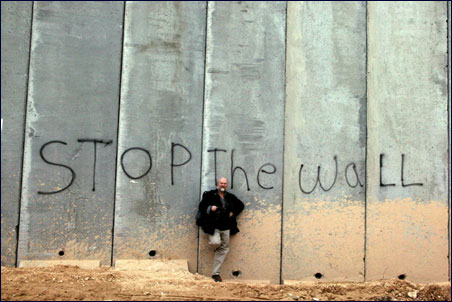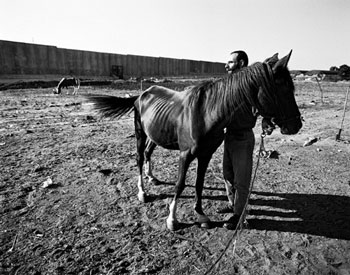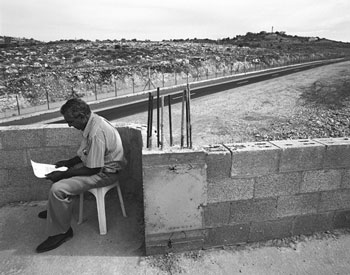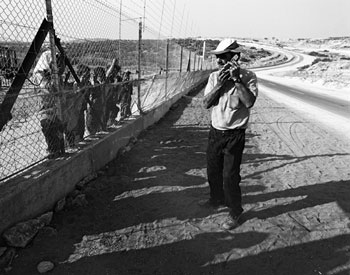 |
 | |||||||||
The Wall
March 2004
|
|||||||||
|
I promised Jusuf Ramzi that I would write down the one question that he keeps asking himself over and over, "Why don't we have international protection?" Where are the Western powers, where is France, where is Germany, where are Italy and Spain...is there only America to protect Israel? Shouldn't civilians be protected in a war?, he asks. "The world is blind...they don't see the tyranny." The old Palestinian turned his back on me...he had already seen plenty of western journalists and aid organizations...but nothing has changed the relentless course of Israels' building of the "security wall" which has just reached completion of it's first phase. Once completed, the "apartheid wall" as the Palestinians call it, will total 600km, encircling their territories on the West Bank. Originally an idea of the Labor government, construction of the wall began in June 2002 as a means of disengaging the two populations and protecting Israel from the infiltration of Palestinian suicide bombers. It would seem that anything in Israel today is justified as long as it is labled a "security matter". "For security reasons" Jusuf Ramzi has lost about 40 dunums of his land. I met him in his truncated orchard removing the weeds from a newly planted citrus tree, already in the shadow of the 8 meter high concrete wall which has transformed the town of Qalqilya into a veritable prison. The residents of Qalqylia (40,000 pop.) can come into and leave this agricultural community through only one point which is controlled by the Israeli military. The old man explained to me that not only had a considerable amount of land been confiscated (40% according to the Palestinian NGO Pengon) but also most of the artesian wells. Indeed, Qalqilya is considered to possess the largest amount of ground waters in the western region of the West Bank. "Once you lose control of the water...then you lose the land." The battle for water has never been far behind the battle for land in this part of the world.
Some of the most fertile land as well as an important number of water resources in the West Bank have been confiscated. The construction of the wall has already destroyed thousands of olive trees as well as other agricultural resources upon which the Palestinians depend for their livelihood. "Enclosure" is having a devastating effect on Palestinian daily life and commerce at all levels. Farmers are separated from their lands, children are separated from thier schools, families are devided, workers can no longer reach their work sites. The Palestinians as well as the Israeli peace movement believe that this "Apartheid Wall" is the beginning of a master plan of economic strangulation in order to force the Palestinians into exhile, what is referred to here as "transfer", and the ultimate realization of Eretz Israel. Whether or not transfer is actually accomplished, the "bantustanization" of the West Bank will effectively negate any possibility of the creation of a viable Palestinian state, turning it rather into a grouping of disconnected entities resembling open-air prisons surrounded by Israeli checkpoints and Jewish settlements. Jayyus is a small farming village in the hills 20 km to the east of Tel Aviv. On a clear day, like this mid-October afternoon, one can see the shimmering Mediterranean Sea from the terrace of the municpal offices. The "security barrier" runs at the foot of the village, six kilometers east of the "green line", separating the farmers of Jayyus from more than 2/3's of their land (9000 dunum) of which 2,500 dunum are irrigated crop lands, over 15,000 olive trees, 50,000 citrus trees, 120 greenhouses, 6 artesian wells (the villages main water source) and livestock pasture. It is harvest time and local farmers are milling about the municipal office. They want to know if there has been any word about when the Israeli soldiers will open the gate? During the month of September they had been camping out in their fields in order to be able to tend to their crops but the last few who had been able to elude the soldiers were forced back to the village side of the barrier several days ago. Before, they were able to reach their fertile lands by ten different roads, today they must all pass through a single security gate and only if they receive permission from the military. "Each day there is a new rule, explains Abdellatif Khaled, "they're making us crazy! Sometimes passage is prohibited to anyone under 35, sometimes it is given only to those with a donkey. The passage times are never the same -- try to organize your donkeys and your sheep to such arbitrary rules!" Nobody has had access to their land for eleven days now. The entire guava harvest is already lost, perhaps only 25% of the vegetables in the greenhouses can be salvaged if the farmers are able to reach their lands soon. Saleh Mohammed Nofal is 52 years old. He has 12 children. All of his family's lands are now on the Israeli side of the fence. He has been unable to take his sheep to graze and is feeding them the residue of pressed olives which according to the veterinarian causes miscarriages. Each morning his sons take the sheep down to the gate crossing in hopes that the Israelis will let them pass -- on the twelfth day they were still not able to pass. As a photographer, I ask myself what photograph can express strongly enough the anxiety felt by a farmer who is unable to tend to his crops, who is unable to reach his land where his fruit and vegetables are growing and rotting on the vine, who is unable to put his flock of sheep out to pasture on the fertile land, who is unable to provide for his family? One farmer angrily asks if the Israelis really believe that they will just sit back and let their families starve to death without taking any action. What would any normal human being do, he asks ? The Alfei Menashe settlement enclave is another chain-linked nightmare for the Palestinians who live in the surrounding villages. In order to incorporate this Jewish settlement onto the Israeli side of the security fence, several Palestinian villages now find themselves in a sort of open air prison on the western or Israeli side of the barrier where they are considered "illegal" and at the same time cut off altogether from the West Bank and the municipal services upon which they depend : water, electricity, health services and schools. One afternoon, while leaving the village of Ras Atiya, this observer came upon a group of about 20 grade school children stuck on the Palestinian side of the security fence, only 300 meters from their homes, yet on the other side of the security fence. Already stranded under the sun for two hours, the Israeli military had not yet come to open the security gate. Not knowing exactly who to call, a desparate father was trying to reach the Red Cross. When the soldiers finally arrived, they had forgotten the key, another hour transpired before the children were finally able to cross over to their homes.
The Palestinian village of Nu'man lies on an isolated rocky hill to the southeast of Jerusalem, not far from Bethlehem and the Jewish settlement of Har Homa. Last August the 200 residents received notice that "for security reasons" their village was going to be incorporated into the municipality of Jerusalem; their houses, their lands, their cemetary, but not them. Palestinians have been living here for the last 150 years, yet they were never given the much coveted Jerusalem/Israeli resident status that Palestinians residing in the Jerusalem area were given after 1967. Since they have only West Bank resident status, their presence here is considered "illegal" by the Ministry of Interior and they will not be permitted to remain in their homes. According to councilman Jusuf Darawi, their problem is not only the "wall" which will separate their village from the rest of the West Bank but they are confronting an incredible bureaucratic machine that wants to negate their existance. The villagers have suggested that this could be solved in either of two ways : by receiving Jerusalem/Israeli resident status or by retracing the path of the "security barrier" so that they are left on the West Bank side. Both of these solutions have been rejected -- Jusuf remarks that it is easier for the Israelis to destroy a village than to change the line on a map. There has been stepped up pressure on the residents to sell their lands - daily military presence in the village, military visits in the middle of the night to "encourage" families to leave, children prohibited from attending nearby schools (Jerusalem municipality) because they should be attending the Bethlehem municipality schools, yet the water supply from Bethlehem was cut since they should be receiving their water from the Jerusalem municipality -- "We will not sell one centimeter of our land," syas Jusuf. He seems to have tremendous faith in the legal system to oppose what appears to an outside observer as an inevitable expulsion -- perhaps it is the only hope that he has to hang onto -- ? The make-shift concrete wall that has been erected in the East Jerusalem neighborhood of Abu Dis is temporary. Presently the concrete slabs that form the wall are more of a nuisance and a source of humiliation than an effective barrier. It will eventually be replaced by an obstacle, far more effective, that school children will not be able to squeeze through or climb over. Palestinians with Jerusalem residents' I.D. will then have to take a long ride around to a checkpoint in order to enter the city. Abu Dis is located on the south-eastern slope of the Mount of Olives, normally only minutes from the Old City. This dusty neighborhood joins the West Bank territories to the Arab quarter of East Jerusalem. This is where the Palestinians had intended to establish thier capital in Arab East Jerusalem. The road that climbs up from Jericho and the Dead Sea comes to an abrupt halt at this walled intersection which has become a busy hub for commuters. Taxi vans arrive from all over to drop passengers here. Each morning and afternoon, children climb over or go under or through the concrete slabs to and from school. The Israeli soldiers tolerate this passage. Palestinian workers have a more difficult time since they are systematically sent back over the wall. It becomes a game of cat & mouse. The workers wait until the soldiers have gone to the other end of the wall or are busy controlling I.D.s and then they scramble over hoping not to be caught.
A graffitti on the wall says, "Ghetto Abu Dis". After what I have heard and observed over the last two weeks, I cannot help but think of the Jewish ghetto of Warsaw. I wonder how it can be possible for people who have suffered such incredibl human tragedy and inhumanity as have the Jews, how is it possible for the Jewish state to be able to inflict a racist system of apartheid on another people ? "So why don't you write that?" Benny Geffen said to me. I met Benny with other Israeli peace activists picking olives on the West Bank. They were helping the Palestinian farmers harvest their olive crop since they had been unable to cross the security fence into what was now designated Israeli territory. The orchard was in close proximity to a Jewish settlement and the settlers had been know to beat the farmers and steal their olives. The Israelis were there as "human shields", to lend a helping hand, and to protest against the "apartheid policies" of their government. As a member of the armed Jewish underground, Benny had faught for the existence of Israel. Now, many years later, as a member of the peace movement, he is still fighting. Benny is a member of an association called "Bereaved Parents For Peace", his son was killed while doing his military service in Southern Lebanon. "You know, said Benny, We struggle and make sacrifices when we are young, thinking that this will guarantee a better world for our children -- and we are still struggling -- my son fell in vain -- this wall is immoral! The recently completed first phase of this devisive barrier stretches for 140 km in the north and parts of East Jerusalem. All along this ugly laceration of the land, this observer encountered scores of personal tragedies, stories of hardship, frustration and desperation. Nobody ignores or denies the tragedy that Palestinian suicide bombers have caused amongst Israelis. But does this justify collective punishment of a whole population? If there is to be a wall separating Israelis from Palestinians, as even Israeli peace activists might agree, then why not follow the "green line" rather than confiscate thousands of acres of Palestinian lands and disrupt the daily lives of hundreds of thousands of innocent people? The "security barrier" as it now stands, will clearly create more hatred and potential candidates for suicide bombings than it can ever hope to suppress. "We continue to believe that any barrier that does not follow the "green line" is a tragedy. As it now stands, the barrier is inhuman and it jeopardizes the security of Israel. Our destinies are bound together -- each confiscated or up-rooted tree is a time-bomb waiting to go off," says Dov Avital, general secretary of Metzer Kibbutz.. On October 1st, the Israeli government approved the new path proposed by the defense establishment for continuation of the next construction phase. By setting the path within the West Bank it will affect the lives of hundreds of thousands of Palestinians. The entire project is expected to cost between NIS 8-9 billion ($2 billion USD). Says Jamal Juma of the Palestinian NGO, PENGON, "You leave us no room to grow, you leave us no room to live -- you want us to live like slaves. It won't work. If you had built the fence along the Green Line, there would be no problem. This way perhaps you'll have quiet for four-five years, but you will create only hatred. Instead of 20% Hamas, you'll have 60%."
© Thomas Haley
|
|||||||||
|
Write a Letter to the Editor
Join our Mailing List
© The Digital Journalist
|


